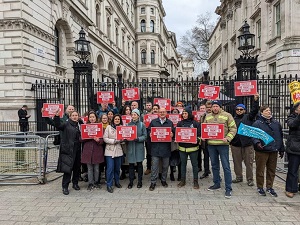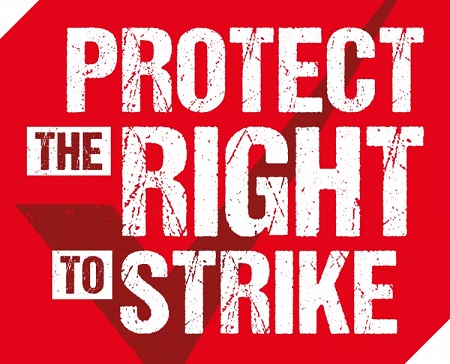Protect the right to strike
New laws are a direct attack on working people’s fundamental right to strike to defend their pay, terms and conditions.
The Strikes (Minimum Service Levels) Act has been passed. The government has now published a draft code of practice and says it is consulting employers and trade unions. The consultation closes on 6 October
The Act will mean that when workers lawfully vote to strike in health, education, fire, transport, border security and nuclear decommissioning, they could be forced to attend work – and sacked if they don’t comply. The TUC has slammed it as a "sham consultation”. Paul Nowak, TUCgeneral secretary, said:
"Ministers have ignored a mountain of evidence on how these laws are unworkable and will escalate disputes. They are ploughing ahead despite their anti-union drive being slapped down by the UN workers’ rights watchdog, and their recent High Court defeat over the use of agency workers during strikes. This government seems intent on breaching fundamental rights guaranteed by international law. That’s why we will fight this legislation all the way – exploring all avenues, including legal routes."
The UN workers’ rights watchdog, the ILO, recently slapped down the UK government over its anti-union agenda and demanded it respect international law. TUC campaign page.
Campaign victory: the NUJ was one of eleven unions, coordinated by the TUC and represented by Thompsons Solicitors LLP, who challenged the government’s changes to the law allowing agencies to supply employers with workers to fill in for those on strike. The TUC had warned the changes to the law will worsen industrial disputes, undermine the fundamental right to strike and could endanger public safety if agency staff are required to fill safety critical roles but haven’t been fully trained. Read our latest release on the victory.
TUC press release: Ministers must make “clear commitment” not to overturn ban on using agency workers to break strikes
The fight continues. The Labour Party has pledged to repeal this Act.
Background to the campaign

This government has gone from clapping key workers to threatening them with the sack if they take lawful action for a pay rise. Instead of listening to the concerns of working people and negotiating fair deals, Rishi Sunak has decided to undermine the right to strike.
As the cost-of-living crisis continues to hurt workers everywhere, we need to be able to stand together and choose to strike when we must. These laws will do nothing to fix this crisis - they will make it even harder for working people to get pay rises.
The UK already has some of the most restrictive trade union laws in the world – but workers have been pushed into action by a government and employers that won’t listen. You can’t legislate away the depth of anger workers feel about how they’ve been treated.
On Wednesday 1 February many thousands took to the streets with striking workers to protest against this draconian bill and in support of fair pay rises.
Every working person is under attack from these new laws. Join the campaign. We must defend the right to strike. Find out more about the anti-strike law.
The NUJ Disabled Members’ Council sends a message of solidarity to all unions involved in strike action
Following Heart Unions week, the NUJ's Disabled Members’ Council expressed solidarity with all unions striking across the UK.
Ann Galpin, chair of the NUJ Disabled Members’ Council said:
“It’s important to remember that disabled workers are disproportionately affected by poor pay and insecure contracts. Collective action on industrial issues is vital for addressing some of these inequalities in employment. The experiences of disabled workers are central to improving outcomes for everyone.
"Union members also strike to protect the quality of the services that they provide. From health to education to transport, disabled people who rely on public services will lose out from cuts to budgets and staffing. Solidarity with striking workers amplifies support for disability equality too.”
Lynn Degele, DMC vice chair, said:
“The RMT strikes are a perfect example of the principle of how protecting workers’ rights improves access for disabled people. Station staff and guards are a vital part of accessible rail travel, including the provision of ramps on trains and assistance navigating stations. From planning travel to buying tickets and securing advice or travel assistance, cuts to staffing leave disabled people without full access to the range of options needed to travel safely and without incurring extra costs.
“Access to transport is a fundamental right that is often denied to disabled people. Planned changes to rail services will reduce access further. Healthcare workers are striking to improve the quality of services and this too, disproportionately impacts on disabled people. ”
Natasha Hirst, NUJ president said:
“The proposed cuts to local radio also land heavily on disabled people who rely on radio for accessing news and addressing loneliness and isolation. The ongoing dispute with the BBC to protect local radio is focused on maintaining high quality, accessible journalism, as well as protecting journalists’ jobs.”

